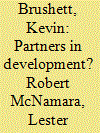|
|
|
Sort Order |
|
|
|
Items / Page
|
|
|
|
|
|
|
| Srl | Item |
| 1 |
ID:
165955


|
|
|
|
|
| Summary/Abstract |
On May 18, 1966, U.S. Secretary of Defense Robert S. McNamara delivered a speech to the American Society of Newspaper Editors in Montreal entitled “Security in the Contemporary World.” Building on remarks that he had made in front of the Senate Foreign Relations Committee (SFRC), the title was deceptively bland and belied its significance. McNamara, heretofore loyal to Johnson, was publicly breaking ranks with official administration policy on Vietnam. In the weeks prior, back in the Pentagon, McNamara had considered and authorized the Joint Chiefs of Staff’s (JCS) proposals, which National Security Advisor Walt W. Rostow had endorsed, to expand Operation Rolling Thunder, a gradual but sustained aerial bombardment campaign against North Vietnam. In Montreal, however, he described the “special satisfaction for a Secretary of Defense to cross the longest border in the world and realize that it is also the least armed border in the world.” He reflected on the “narrow” and “stereotyped terms” that framed discussions of national security, as well as the “eradicable tendency to think of our security problem as being exclusively a military problem.” In lieu of these “clichés,” he suggested that “security is development” and that poverty in the developing world was a greater challenge to international security than a Communist master plan.1
|
|
|
|
|
|
|
|
|
|
|
|
|
|
|
|
| 2 |
ID:
128608


|
|
|
| 3 |
ID:
137375


|
|
|
|
|
| Summary/Abstract |
In 1968, the newly appointed World Bank president, Robert McNamara, asked former Canadian Prime Minister Lester B. Pearson to chair a Bank Commission on International Development in hopes that he could revive the North’s flagging commitment to foreign aid promised under the banner of the Decade of Development. The Commission and its Report—Partners in Development—have a general reputation as farsighted approaches to problems of official development assistance. In Canada, the Pearson Commission is viewed through the lens of Canada’s commitment to Middle Power multilateralism. This analysis tests both interpretations by examining the Commission and the conception and reception of its work. Whilst the Middle Power concept circumscribed Pearson’s role and effectiveness, the Commission succeeded in helping Canada’s chief ally, the United States, share the burden of development assistance with its European allies. As in the realm of peacekeeping, Pearsonian development diplomacy was as much about shoring up relations with Northern allies as it was with developing new Southern friendships.
|
|
|
|
|
|
|
|
|
|
|
|
|
|
|
|
| 4 |
ID:
115587


|
|
|
| 5 |
ID:
098644


|
|
|
| 6 |
ID:
123847


|
|
|
|
|
| Publication |
2013.
|
| Summary/Abstract |
This article examines the tumultuous relationship between the World Bank and the U.S. government during the seventies. Drawing on previously untapped documents from the bank archives, it details the rise of U.S. opposition to the bank in the seventies and describes the resistance by the bank's president, former U.S. secretary of defense Robert McNamara, to American efforts to influence the organization during the time. A study of the bank's relationship with Chile in the early seventies demonstrates how the organization's behavior was guided as much by internal factors-in this case a desire to maintain its creditworthiness-as it was the result of pressure from the U.S. government. Nevertheless, the article concludes that U.S. support remained critical to the bank and, as such, the organization's autonomy was significantly bounded.
|
|
|
|
|
|
|
|
|
|
|
|
|
|
|
|
|
|
|
|
|